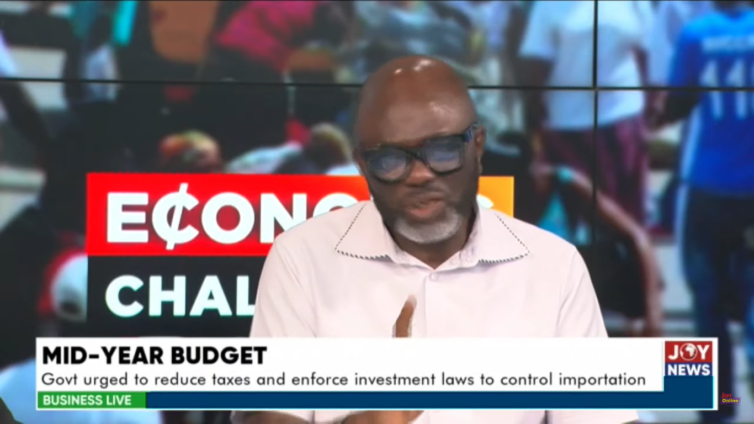The trading community in Ghana is mounting pressure on the government to use the Mid-Year Budget to cut taxes while enforcing the investment laws to control the rising level of importation into the country.
This will also help control imported inflation and consequently reduce year-on-year inflation.
According to the Ghana Union of Traders Association (GUTA), the economic climate is already not favorable, thus driving most of them out of business.
They contend if the mid-year budget doesn’t address their concerns, most of them will be forced to fold up.
Speaking on the Joy Business Pre-Budget Forum on the theme “What Should the Policy Direction be in the 2023 Mid-Year Budget”, President of GUTA, Joseph Obeng, said the concerns of businesses mustn’t be taken with a pinch of salt.
“We don’t have the space to develop and grow. That has been our main problem. Excessive taxation has put a toll on the private sector, making us uncompetitive. We cannot even sell our produce to the neighboring countries because of the cost of the produce”.
Touching on importation, Dr. Obeng argued that Ghana only owns about 60% of its export earnings which he believes is worrying.
“I have a serious problem with importation. Ghanaians do not own the economy, the export earnings we get only about 60% as a nation. That’s why you always have a problem with foreign exchange”.
“The excessive importation that we do, only about 20% is for the locals and the 80% belongs to foreigners”.
According to the data from the Bank of Ghana, the total import bill for the first four months of 2023 was provisionally estimated at $4.0 billion, down by 13.9% year-on-year. The decline in imports was driven largely by non-oil imports and, to a lesser extent, by oil and gas imports.
Again, the trade surplus improved further to $1.6 billion in the first four months of 2023, driven mainly by import compression. The value of total exports was estimated at $5.65 billion, down by 3.6 percent year-on-year.
The fall in export earnings was driven largely by crude oil exports and to a lesser extent by non-traditional exports, as gold and cocoa exports increased.
Latest Stories
-
64% of CEOs in Ghana optimistic firms will thrive beyond next decade if… – PwC Report
9 seconds -
NPP vs. EC: A Dance of Convenience?
6 minutes -
Gold Stars announce Appiah McCarthy, Roland Frimpong contract extensions
10 minutes -
Abuakwa South MP mourns the passing of Ernest Kumi
19 minutes -
It’s not too late; let’s work together to fix the broken EC – Omane Boamah to NPP
28 minutes -
You should’ve listened when we raised red flags about the EC – Omane Boamah to NPP
41 minutes -
Hassan Ayariga opposes alleged attempt to establish Nigerian kingdom in Ghana
42 minutes -
Ablekuma North: Are EC leaders trying to save their jobs because NDC threatens to remove them? – Nana B asks
55 minutes -
Today’s Front pages: Wednesday, July 9, 2025
1 hour -
NPP questions EC and police role in Ablekuma North election
1 hour -
Construction of 24-Hour-Economy market starts soon on Jema-Kintampo highway
1 hour -
‘It’s collation, not rerun’ – Justin Kodua fires at EC over Ablekuma North dispute
2 hours -
NPP drags EC to court for contempt in Ablekuma North dispute
3 hours -
Musk’s AI firm says it’s removing ‘inappropriate’ chatbot posts
3 hours -
We have done our part in preserving cedi’s true value – BoG Governor
4 hours

